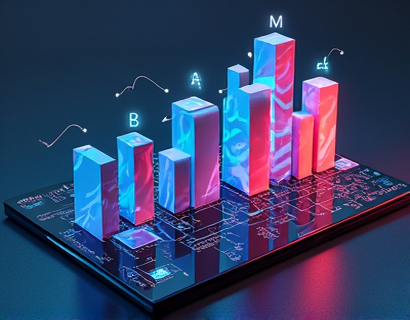Smart Contracts and Management Tools: Revolutionizing Governance for Enhanced Democracy and Participation
In recent years, the intersection of technology and governance has given rise to innovative solutions aimed at transforming traditional democratic processes. Among these, smart contracts and advanced management tools stand out as pivotal elements in creating a more accessible, efficient, and participatory form of governance. This article delves into the transformative potential of these technologies, exploring how they can streamline decision-making, enhance transparency, and boost community engagement, ultimately fostering a more universal and inclusive democracy.
The Role of Smart Contracts in Governance
Smart contracts are self-executing contracts with the terms of the agreement directly written into code. They run on blockchain technology, a decentralized and immutable ledger that ensures transparency and security. In the context of governance, smart contracts can automate and enforce the execution of agreements and policies, reducing the need for intermediaries and minimizing the potential for human error or manipulation.
One of the most significant advantages of smart contracts in governance is their ability to enforce rules and regulations automatically. For instance, in the realm of public procurement, smart contracts can ensure that all bids are evaluated based on predefined criteria, and the winner is selected and paid automatically once the conditions are met. This not only speeds up the process but also increases accountability and reduces the scope for corruption.
Enhancing Transparency through Blockchain
Transparency is a cornerstone of democratic governance, and blockchain technology, which underpins smart contracts, plays a crucial role in achieving this. The immutable nature of blockchain ensures that once a transaction or contract is recorded, it cannot be altered or deleted. This provides a tamper-proof record of all governance activities, from budget allocations to policy implementations.
Citizens can access this information in real-time, gaining insights into how their government operates. This level of transparency builds trust and fosters a more informed citizenry. For example, in the context of public finances, blockchain can track the flow of funds, from tax collection to expenditure, ensuring that every transaction is visible and verifiable. This reduces the risk of misappropriation and enhances public confidence in government institutions.
Streamlining Decision-Making Processes
Smart contracts and blockchain technology can significantly streamline decision-making processes in governance. By automating routine tasks and ensuring that decisions are based on predefined rules, these tools can reduce bureaucratic delays and improve efficiency. For instance, in the context of voting systems, blockchain-based smart contracts can facilitate secure and transparent elections, reducing the time and cost associated with traditional voting methods.
Moreover, smart contracts can enable more direct forms of democracy, such as liquid democracy, where citizens can delegate their voting power to trusted representatives. This delegation can be managed through smart contracts, ensuring that the representatives act in accordance with the instructions provided by their constituents. This not only increases participation but also ensures that the democratic process is more responsive to the needs and preferences of the community.
Boosting Community Engagement
Community engagement is vital for the health of any democratic system. Smart contracts and management tools can enhance engagement by providing platforms where citizens can participate in governance decisions more easily. For example, online platforms powered by smart contracts can facilitate public consultations, allowing citizens to propose, discuss, and vote on policy initiatives. These platforms can be designed to be user-friendly, accessible, and inclusive, ensuring that a diverse range of voices is heard.
Furthermore, these tools can provide real-time feedback and analytics, helping policymakers understand the sentiments and preferences of the community. This data-driven approach can lead to more informed and effective policy-making. For instance, a city government could use a blockchain-based platform to gather input on urban development projects, ensuring that the final plan reflects the collective wisdom of the community.
Challenges and Considerations
While the potential of smart contracts and management tools in governance is vast, there are several challenges and considerations that must be addressed. One of the primary concerns is the technical complexity and the need for a certain level of digital literacy among citizens and government officials. Ensuring that these tools are accessible and user-friendly is crucial for widespread adoption.
Another challenge is the regulatory framework. Governments must develop clear guidelines and standards to govern the use of smart contracts and blockchain technology in public administration. This includes addressing issues related to data privacy, security, and the legal enforceability of smart contracts. Collaboration between technologists, policymakers, and legal experts is essential to create a robust and adaptable regulatory environment.
Case Studies and Real-World Applications
Several initiatives around the world are already leveraging smart contracts and management tools to enhance governance. One notable example is the city of Zug in Switzerland, often referred to as the "Crypto Valley," which has implemented a blockchain-based identity management system. This system allows residents and businesses to create digital identities that can be used to access various city services, streamlining administrative processes and enhancing security.
Another example is the use of smart contracts in the management of public utilities. In Estonia, a blockchain-based system is used to manage the distribution and payment for electricity, ensuring transparency and efficiency in the process. This not only reduces operational costs but also increases consumer trust in the utility provider.
Future Prospects
The future of governance through smart contracts and management tools is promising. As technology continues to evolve, we can expect more sophisticated and user-friendly platforms that further democratize the decision-making process. The integration of artificial intelligence and machine learning can enhance these platforms by providing predictive analytics and personalized recommendations, making governance more proactive and responsive.
Additionally, the development of interoperable blockchain networks can facilitate collaboration between different governments and organizations, creating a more connected and cooperative global governance framework. This can lead to more effective solutions to transnational challenges such as climate change, security, and economic inequality.
Conclusion
Smart contracts and management tools have the potential to revolutionize governance, making it more transparent, efficient, and participatory. By automating processes, enhancing transparency, and boosting community engagement, these technologies can help bridge the gap between citizens and government, fostering a more inclusive and effective democratic system. As we move forward, it is essential to address the challenges and ensure that these tools are accessible and beneficial to all members of society.











































